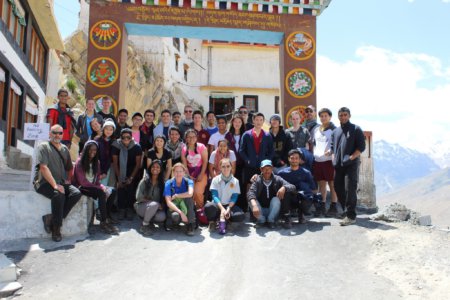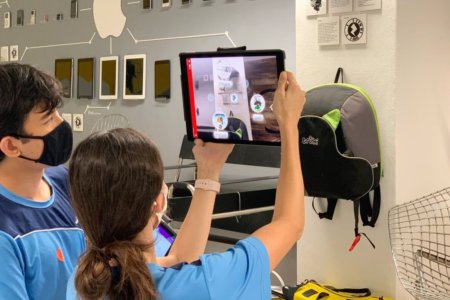
Nobody understands the gravity of the climate crisis better than our world’s scientific community. However, with global warming, relentless waste production, pollution, and deforestation, amongst many other topical issues, the movement for a greener tomorrow has been building a larger presence in various landscapes.
Governments and corporate offices aren’t the only bodies falling in line — international schools in Asia are championing the importance of building a strong and prosperous future too. They’re teaching their pupils to be eco-conscious, self-sufficient world citizens through curricula encompassing pressing challenges and extracurriculars designed to broaden horizons.
Through hands-on opportunities, students across Asia are gaining the real-world skills needed to better the world for this generation and the ones to come. At the same time, they are developing core leadership abilities that might strategise ways to make organisations more environmentally friendly or innovate the next big device to spur sustainable development. Sound like a future you would like for your child? Here are three schools in Asia empowering youths to evolve into informed and active global citizens.
Tanglin Trust School
Most schools are models of unsustainability. Every year, US schools emit an estimated 72 million metric tonnes of carbon dioxide and send 530,000 tonnes of food waste to landfills. The UK’s education sector only recycles 11.2% of its waste. Everywhere else, lights and heating stay on unnecessarily, and fossil fuels continue to power private transportation. Often, changing things are rife with challenges, from low budgets to public ignorance.
But in Singapore, one school is braving this with small — yet significant — steps: Tanglin Trust School.
During its Eco Week, each day was focused on one of the United Nations’ Sustainable Development Goals (SDG). Students confront current issues on climate change and sustainability — then apply their knowledge in various activities, such as public speaking competitions, upcycling, and fundraisers that led to nearly 5,000 Singapore dollars donated to Conservation International. Tanglin’s Eco Week initiative won the Outstanding Environmental Project Award at the Singapore School Green Awards 2022.
A lot more work to promote sustainability is getting done here. The curriculum takes a cross-disciplinary approach to the SDGs. Students and staff reduce electricity and paper, avoid single-use plastic, and recycle e-waste, food, plastic, aluminium and paper. Plants flourish. To get to school, buses, public transport, and cycling are encouraged. Solar panels brought down 15% of electrical consumption. New light fittings saved energy by over 60%
Initiatives and projects, organised as part of the school’s CAS (Creativity, Activity, Service) programme, empower students to be involved in community service in Singapore and beyond. Events, travel and activities minimise their environmental impact. Trips and visits expound respect for the planet and follow the “leave no trace” principles.
Changing hearts and minds isn’t easy but a committed, whole-school approach like Tanglin’s offers hope that schools can realise their full potential to transform students into stewards of their communities, the earth and its resources.

Tanglin Trust School offers its students the English National Curriculum with an international perspective. Source: Tanglin Trust School
Marlborough College Malaysia
Marlborough College Malaysia (MCM) provides a British education tailored to stimulate, challenge and support students in discovering and developing their talents in various areas.
Set on a safe and spacious 90-acre estate, MCM is guided by principles of compassion, companionship and conversation. Here, students join the faculty in pursuing questions, not simply answers; in discovering ideas, not merely facts; and in appreciating the journey, not solely the destination.
Highly rigorous academics, a caring community, qualified teachers, student-focused learning, and college-preparatory courses — these are the features that ensure student success at MCM. Academic programmes here offer students opportunities and challenges in a supportive environment. The school’s IGCSEs and International Baccalaureate Diploma Programme open doors to many of the world’s finest universities.
What further sets the college apart is its range of co-curricular opportunities.sports sport to music and art, each and all provide challenge and comfort as a critical part of a meaningful, holistic education. They develop a pupil’s understanding of global issues and their responsibilities as global citizens. “The provision of co-curricular activities is a real strength of the college,” according to COBIS Report 2021.
“With our shared DNA and close links with Marlborough UK, we value and instil breadth of experience, intellectual rigour, creative joy and sporting excellence,” says Alan Stevens Master of Marlborough College Malaysia.

Jerudong International School’s impressive school grounds are a considerable asset that enhances the overall learning experience for its students. Source: Jerudong International School
Jerudong International School
Jerudong International School (JISBrunei) has the campus and the people that transform children into success stories. The safe, secure, green campus environment of JISBrunei was a key factor in maintaining the health and welfare of over 220 boarding students during the recent COVID-19 pandemic.
At its award-winning 10,000 metre-squared Outdoor Discovery Centre (ODC), boarding students were able to escape from the pandemic and immerse themselves in nature – harvesting honey from the stingless beehives, observing and listening to a rich tapestry of wildlife, working together in teams to create compost, plant trees and appreciate this lush haven of tranquillity.
“We encourage and nurture a love and respect for the outdoors in our students, to provide them with a tool for physical and mental well-being,” says Principal Nicholas Sheehan.
Recently, the school was awarded Green Flag status by Global Eco Schools – the culmination of JISBrunei’s consistently outstanding efforts to be as sustainable as possible in terms of its campus, community, and curriculum. Over at the ODC, opened in 2017 by the Earl and Countess of Wessex, the school community focuses on in-school paper recycling, House Green Businesses, and volunteering, among others.
“We want our students to be well-educated, well-rounded, socially and environmentally responsible when they leave JIS,” says Principal Sheehan. “Boarders are especially able to take full advantage of this outstanding and unique environment. We are proud to see alumni going on to university well-prepared for the challenges ahead and able to make a genuine difference.”
*Some of the institutions featured in this article are commercial partners of Study International










